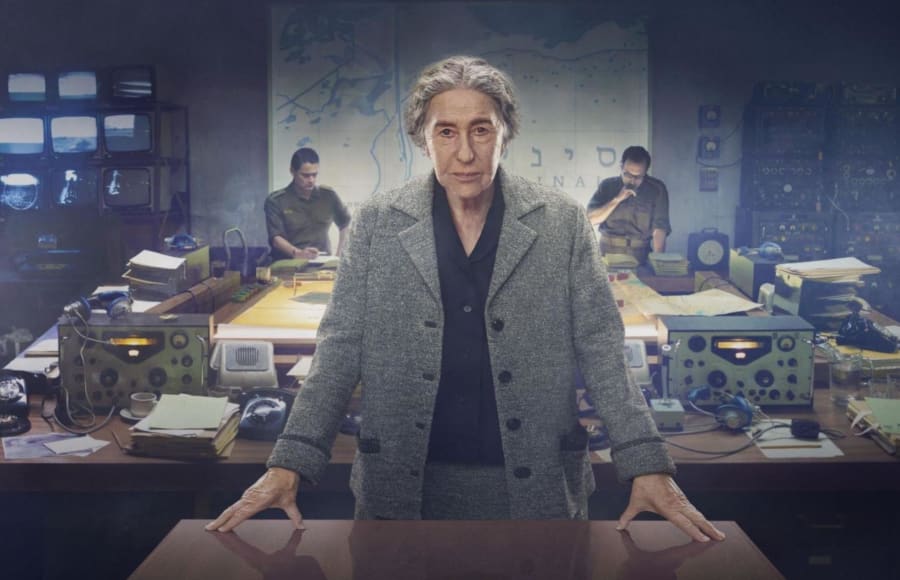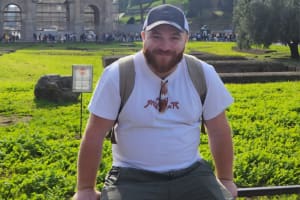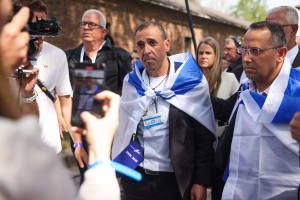The vindication of Golda

Among my all-time favorite movies was the 1982 film, “A Woman Called Golda,” featuring Ingrid Bergman, who played the lead role. Almost from the beginning, it takes us back to Golda Meir's early childhood, to the pogroms of Kyiv, Russia, moving on to her early days in America, followed by her immigration to a kibbutz in 1920. From there, we see her come into her own, as a union leader, ultimately catapulting her to prime minister.
The film is compelling, entertaining, visually pleasant and contains elements of romance and adventure but a complete and total departure from the present, new version of Golda, portrayed by the multi-talented, Oscar winner, Helen Mirren.
It doesn’t take long to realize that the subject of the film is one-dimensional, never moving from the catastrophic event of the Yom Kippur War, while crawling inside the heart and head of Golda, the woman, the mother, the grandmother, the friend, the co-worker and, of course, the prime minister. No emotion is left out, and it is about as raw as it gets.
Golda enters a room where she is about to undergo a full-fledged inquiry, known as the Agranat Commission, on her role in overseeing the Yom Kippur War. As she takes an oath, to tell the truth, the events unfold, and things get underway.
To create the full illusion of war, devastation, doom and despair, the film is often viewed in shaded, dystopian colors or explosive apocalyptic battles with fire and brimstone calamity of these cataclysmic events that came very close to obliterating the Jewish state back in October 1973, during a span of 19 horrific days.
It is here that we see the stuff of which Golda was made. Since no one really knew the best course of action to take, even though everyone had a good idea of how things were going to play out, the dilemma centered around the best way to avoid the greatest number of casualties without having the strategic advantage of striking first.
Promises had been made to the U.S. that Israel would not make the first move, something which they assured Israel would threaten receiving needed assistance, lest they appear to be the aggressors. So, they waited and waited and waited. Finally, the siren was sounded on that Saturday afternoon of Yom Kippur.
Their fears were realized as they began to be attacked on two fronts; the Egyptian and Syrian borders. The generals and military men looked for guidance from Golda while she, too, sought their best counsel on how to proceed. It was in the middle of all of this process that Moshe Dayan went catatonic on her. He is no longer sound or fit to lead and determine anything, as he completely falls apart, unable to cope with what he has seen around him. Golda immediately goes to Israel Defense Forces Chief of Staff David Elazar “Dado” and tells him to no longer take orders from Dayan.
We are right there, accompanying the constant incoming reports of the massive death toll, the originally-recorded Hebrew orders from the battlefield and cries of despair coming from soldiers and commanders whose lives were being snuffed out. Golda is crushed and despondent by the overwhelming destruction and chaos which is hemorrhaging everywhere but can’t be stopped.
Her excruciating facial expressions say it all. Here is an old woman, agonizing over the death of so many young men while, simultaneously, desperately trying to beg Henry Kissinger for fighter planes and diplomatic help. But the stoic and unimpassioned secretary of state does his best to explain how OPEC has punished Israel’s American benefactor by cutting them off from their precious resources. He also reminds her that Nixon is in the throes of the Watergate scandal, trying to rival her difficulties with theirs.
It is at this moment that we realize that American assistance, as helpful and beneficial as it’s been, has never come with full-throated generosity or a place of heartfelt conviction, but rather more from a political vantage point and an almost obligatory rescue which was forced on our allies, lest they realize their lack of conscience.
There is one point where Kissinger, while visiting Israel, says to Golda: 'You must realize that I am, first of all, an American, secondly, secretary of state and thirdly, a Jew.' That sums it up.
Throughout Golda’s horrific and persistent nightmares, cold sweats and crippling reactions, we watch as she goes in and out of Jerusalem’s Hadassah Medical Center, undergoing debilitating chemotherapy which makes her terribly sick, while we watch her lose clumps of hair, falling into the drain as she is shampooed.
Nonetheless, she is unstoppable. Meticulously keeping notes of every dead soldier, she jots them down in a small pocket-sized logbook, always kept in her purse, which she was famous for carrying everywhere. Those names never leave her sight or her memory, she assures those who were appointed to judge her conduct, in this war to end all wars.
What we see is a deeply emotional and caring woman whose iron-clad resolve and tour de force served her in keeping it together, both mentally and physically on a personal level, but also as a leader among leaders. One who threatened the “Superpower” when she had to but who also stood in a corner weeping over the loss of her co-worker’s son. The tenderness of that moment makes us realize this woman was made of real substance, the likes of which we are missing today.
The film ends with a full vindication of Golda Meir who, although viciously attacked at the time for her handling of the war, along with the tremendous loss of lives which devastated every citizen, no one is able to fault her for the fact that her hands were so often tied by others more powerful and that she did the best she could with what little she had.
The film, although exceedingly difficult to watch, is a triumph for the reputation and full exoneration of Israel’s only female prime minister, providing much-needed context into the dirtiness of how wars are fought, as well as the fact that, when it comes to Israel, it is clear that military prowess is not what saves the day. There is a sense that other factors were very much in play during a time when we clearly were losing and struggling to stay afloat.
This film makes that eminently clear, and that difference was and still is the God of Israel!

A former Jerusalem elementary and middle-school principal who made Aliyah in 1993 and became a member of Kibbutz Reim but now lives in the center of the country with her husband. She is the author of Mistake-Proof Parenting, based on the principles from the book of Proverbs - available on Amazon.














